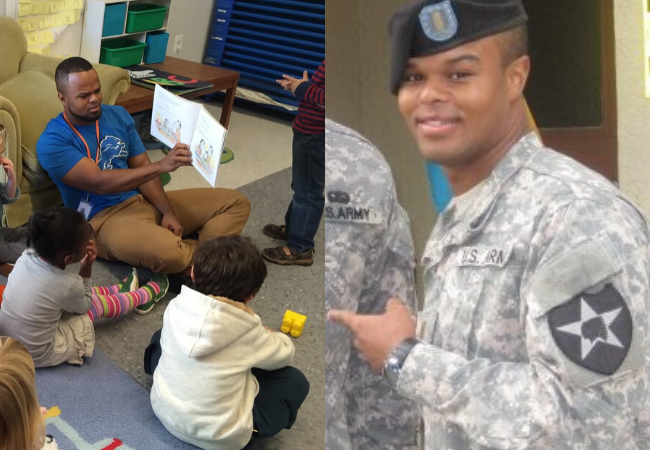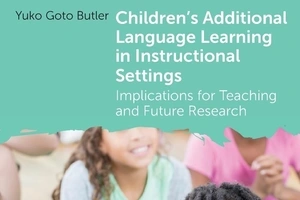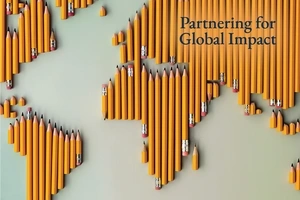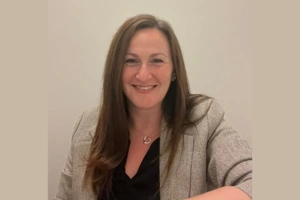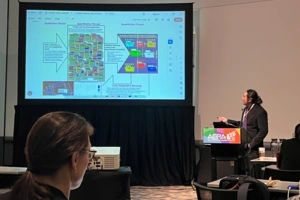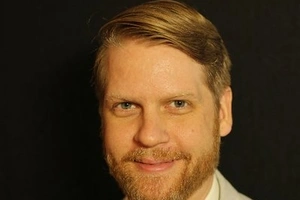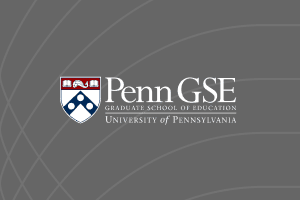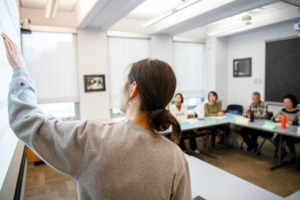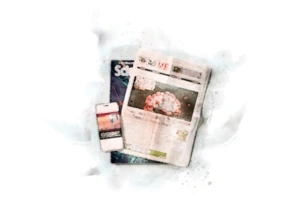Daris McInnis, left, reading to pre-kindergarten students in Washington, DC, and right, serving in the Army.
In 2013, as his time in the Army was winding down, Daris McInnis was trying to figure out what came next.
He always knew he liked the idea of working with kids, but didn’t have a firm idea how he might do that. While stationed at Fort Lee, McInnis and members of his unit volunteered at a school in nearby Petersburg, Virginia. The school had been underfunded and lost its accreditation.
But it was the first place where McInnis saw a potential future as an educator. Now, after teaching in schools and nonprofit literacy programs, and looking at new ways to serve marginalized communities as a doctoral student in Penn GSE’s Reading, Writing, and Literacy program, McInnis has been named a Tillman Scholar.
Named after Pat Tillman, a former NFL star and Army Ranger who was killed in Afghanistan, the Tillman Scholar Program supports active duty service members, veterans, and their spouses with academic scholarships, a national network, and professional development opportunities, so they are empowered to make an impact.
McInnis is the first Penn GSE student, and is believed to be the first Black Penn student, to receive the honor.
McInnis joined the Army shortly after finishing his undergraduate degree, and was commissioned after completing the Army Officer Candidate School.
McInnis: My very first job, I was overseas. I had a platoon of 88 people and I was only 22 years old.
I hadn’t led people before. I hadn’t managed people before. I failed. I failed so many times.
I learned to rely on the experts in the field. I had really good non-commissioned officers, and my soldiers really had my back. They sacrificed so much so I could learn from them. They were so patient with me.
Because of them, I understood that leadership is about protecting the rights, the lives, and the liberties of the people under your command and leadership.
I learned what service really means for me. Service is looking beyond yourself, looking to a cause, and looking beyond your own goals and dreams and looking at using your talents and knowledge for someone else and the greater good.
I learned the power of comradery, relying on people on your left and right. I’ve done that, going into teaching and coming here to Penn GSE. I’ve learned I can’t do everything by myself. That's why there are so many people in this world — we are all meant to help one another in some capacity.
[[quote|center|“That's why there are so many people in this world — we are all meant to help one another in some capacity.” — Daris McInnis|share]]
While McInnis said he loved his time in the military, he decided a career in the Army was not right for him. After his experience volunteering at the school in Petersburg, he applied to Education Pioneers, an organization that brings people with different skillsets together to improve schools. His last day in the Army was June 6. He was still in his uniform when he drove to New Orleans for a fellowship with Crescent City Schools that began June 10.
McInnis: If you look at pictures of me in the fellowship, I'm still standing at attention. I was still a soldier.
I worked at a charter school as part of a crew restoring the building. One day, there was a line of parents waiting to register for the school. Many had kids with them. I found a book and started reading to them.
A parent asked, “Are you a teacher?”
I said no.
“You should consider it,” she said. “You are really great with kids.”
When his fellowship ended that summer, McInnis moved to Washington, DC to explore moving into a classroom. He applied for a teaching certification fellowship through the Center for Inspired Teaching. Before, his volunteer efforts had always been with high school or older middle school students.
However, he was offered a position teaching pre-kindergarten to 3- and 4-year-olds.
McInnis: I was more terrified to teach small kids than to join the Army. They said trust us. We know you have the personality to do this. I did it, and it was the best experience of my life. I found my purpose. I found something I loved more than anything else.
I still have a great relationship with the school and those families. Even now, I still FaceTime with my kids and their parents. They’ll mail me pictures they drew. They’ll send me bookmarks.
All the volunteering, the love I had for wanting to work with kids, it all came together.
While in DC, McInnis also volunteered with the Homeless Children’s Playtime Project, which provided literacy-based playtime opportunities for children in transitional housing around the city. He started thinking about new ways to serve these children, children with special needs, and children from families who have marginalized identities. He wanted to learn more about how to make literacy more accessible to all children.
McInnis felt pulled to dive into the research, and do some of his own. That led him to apply to Penn GSE.
McInnis: Robust literacy opportunities should be available to everyone. It shouldn’t just be for kids who are in private school or the school where I was.
This goes beyond the basic teaching of reading and writing. I’m talking about getting kids to question the why behind the way things are. Introducing scientific concepts, and thinking of themselves as creators. Kids already have the ability to do these things. The question is how do we empower them to know they do.
I remember being in class when the email came in. I screamed and hugged my co-teacher. I couldn’t believe that this little Black kid from Flint, Michigan is going to go interview at the University of Pennsylvania
I knew I wanted to work with Dr. Gadsden. Her work was exactly what I wanted to do. When I interviewed, Dr. Campano shared some stories about how his family was military, and then we’ve come to work together. Dr. Thomas was amazing. Dr. Ravitch has been great to brainstorm with.
Since I came to Philadelphia, I’ve just been on this path of discovery. I’m reading, and reading, and reading, and looking around the city, finding ways to get involved.
I took a position with the Free Library of Philadelphia as a summer learning curriculum specialist to design play opportunities. That position fueled a lot of research ideas about how to address what kids are learning away from their teachers, and what kind of resources we can and should be creating.
I think I want to become a professor of education, and work with pre-service teachers. I’m particularly interested in teachers who are going to go work in marginalized communities, and work with organizations that have volunteer opportunities for people who are in transitional housing or in underserved communities.
I want to remind folks of the playfulness, the softness, that should be there for every young child. And I think that should be there for kids beyond early childhood. They need that constant love and reassuring.
